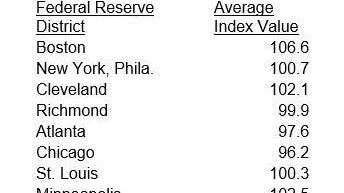Small business owner optimism is historically low. The Small Business Optimism Index (SBOPI) fell to 89 in April, 9 points off the 49-year historical average of 98. April’s Index continues a 16-month streak of below average readings. The Index stood at 100.1 in August 2021, drifting down to its current weak level. There’s a lot happening across the country: strikes, bank failures, rising interest rates (10 Fed hikes in a row), inflation, labor shortages, surges in crime, major store closings, large population movements, etc. All have an impact on local economies and the experiences of Main Street business owners, but the impacts are not evenly spread. As a consequence, there are major differences in optimism across the country. The Index is highest in the Boston Federal Reserve district (106.6) and lowest in the San Francisco district (96.0). Owners in the Chicago, Kansas City, and Atlanta districts are of similar levels of pessimism. Owners in the Cleveland and Minneapolis Fed districts were on the optimistic side, although not nearly as good as Boston.
Highly optimistic owners were most prevalent in the New England and the South Central regions. However, while New England had the lowest incidence of low Index values, the South Central region was among the highest, with pessimism rates higher only in the Mountain and Pacific regions. Optimists were least frequent in the Mid-Atlantic and South Atlantic regions, while the New England and South Central regions had the highest frequency of optimists. Overall, owners in the South Central region dominated the “Over 130” and the “Under 100” categories.
For all business owners, optimism has been fading since it reached its most recent peak of 100.1 in August of 2021 to 89.0 in April 2023. But pessimism on the West coast stands alone as the worst by far. Expensive state tax structures and voluminous regulations governing all areas of business operations make it exceedingly difficult for small business owners to operate and succeed. More generally, higher interest rates and sticky inflation will continue to erode the financial wellbeing of owners and their customers. Real earnings have declined half a percent over the last 12 months. The Administration is pushing for higher taxes on profitable small businesses and providing incentives for banks to make more loans to riskier borrowers, which does not promise good outcomes as 2008 showed us. Reaching a debt limit deal may provide an opportunity to blunt some of the more repressive taxes and regulations and deliver some good news.
Read the full article here




